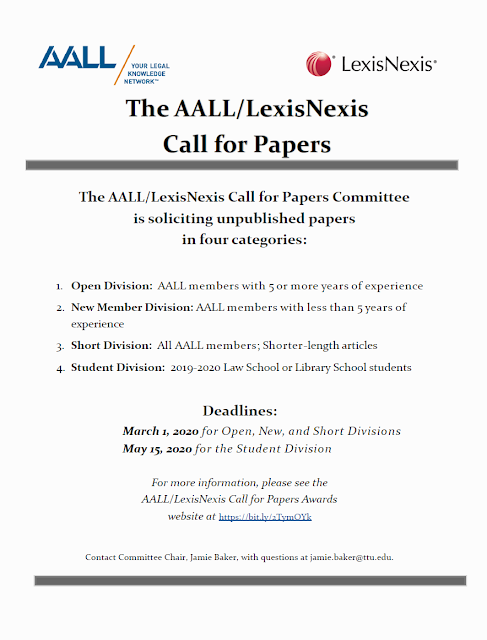A Reform Idea - Let 3Ls Receive Pay During Externships
An ABA Journal article proposed a program to let 3Ls earn credit while getting paid for their externships and not paying the law school tuition. This sounds like a pretty sound idea.
Currently, under the ABA Standards, law students cannot be financially compensated for earning credits. The thinking being that the law school credit is compensation for the work performed. However, most law schools require their law students to pay tuition for the credits, so the students are paying to essentially work for free.
This might be okay in better economic times if the students are receiving a true academic experience while on the job. But it's hard to determine the quality of the on-the-job training that many law students receive at their externships. If they are not getting a quality education during their externships but must still pay tuition, then it becomes that the students are paying thousands of dollars to work for free.
An executive at Cisco, Mark Chandler, proposed the following reform:
1. Third-year law students who want practical experience should be able to receive academic credit for working—for pay—in a law firm, company legal department or court. The difference from today’s externships, for which full credit is granted, is simply receipt of compensation, which requires a change in the ABA Standards for Approval of Law Schools Interpretation 305-3 (PDF). One can suppose that the proscription on compensation for externs is based on the premise that employers will be willing to provide a more academically based experience if the work is performed without compensation. But there’s no empirical basis to support that, and the standards require extensive oversight of externships in any case. Unlike today’s externships, the law students would also not pay tuition to the law school, thereby cutting their costs by one-third.
2. Law schools must provide externs with academic support, going beyond the ABA oversight rules, to ensure real legal work is being performed, and supplementary required readings to provide context. This work could also give rise to academic credit. An effective program could provide the necessary checks that the work is genuine practical experience, on the order of the clinics that many schools run today.
3. The employer should also be allowed to cover the tuition the school would otherwise receive. The ABA rule change must accommodate the ability of the employer to make this payment so that law schools can continue their faculty work and research programs.
Cisco is even implementing a version of these suggestions while still fitting within the current ABA Standards. According to Chandler, "[Cisco's] hope is the students emerge with a semester’s less debt and some savings from the internship salary. More importantly, they should have gained practical skills and experience that will serve them well regardless of the law practice after they graduate. And the law school will not suffer a degradation of resources to continue academic programs, support faculty research and meet other needs.
Again, this sounds like a win-win situation for everyone involved.
Currently, under the ABA Standards, law students cannot be financially compensated for earning credits. The thinking being that the law school credit is compensation for the work performed. However, most law schools require their law students to pay tuition for the credits, so the students are paying to essentially work for free.
This might be okay in better economic times if the students are receiving a true academic experience while on the job. But it's hard to determine the quality of the on-the-job training that many law students receive at their externships. If they are not getting a quality education during their externships but must still pay tuition, then it becomes that the students are paying thousands of dollars to work for free.
An executive at Cisco, Mark Chandler, proposed the following reform:
1. Third-year law students who want practical experience should be able to receive academic credit for working—for pay—in a law firm, company legal department or court. The difference from today’s externships, for which full credit is granted, is simply receipt of compensation, which requires a change in the ABA Standards for Approval of Law Schools Interpretation 305-3 (PDF). One can suppose that the proscription on compensation for externs is based on the premise that employers will be willing to provide a more academically based experience if the work is performed without compensation. But there’s no empirical basis to support that, and the standards require extensive oversight of externships in any case. Unlike today’s externships, the law students would also not pay tuition to the law school, thereby cutting their costs by one-third.
2. Law schools must provide externs with academic support, going beyond the ABA oversight rules, to ensure real legal work is being performed, and supplementary required readings to provide context. This work could also give rise to academic credit. An effective program could provide the necessary checks that the work is genuine practical experience, on the order of the clinics that many schools run today.
3. The employer should also be allowed to cover the tuition the school would otherwise receive. The ABA rule change must accommodate the ability of the employer to make this payment so that law schools can continue their faculty work and research programs.
Cisco is even implementing a version of these suggestions while still fitting within the current ABA Standards. According to Chandler, "[Cisco's] hope is the students emerge with a semester’s less debt and some savings from the internship salary. More importantly, they should have gained practical skills and experience that will serve them well regardless of the law practice after they graduate. And the law school will not suffer a degradation of resources to continue academic programs, support faculty research and meet other needs.
Again, this sounds like a win-win situation for everyone involved.


Comments
Post a Comment